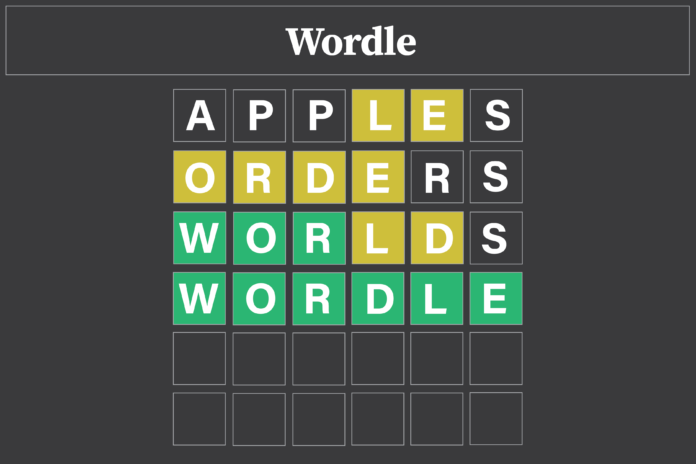Wordle’s popularity sparks conversation about community and cognitive benefits of word games
By MAYA SHYDLOWSKI — features@theaggie.org
In six guesses of five letters, people can test their linguistics skills daily thanks to Josh Wardle and his internationally-played word game, Wordle.
Similar to a crossword puzzle, players are given six rows of five blank letter tiles. They guess a five-letter word, receive feedback about whether the letters they chose are present in the word of the day and repeat that process until they guess the correct word — or use up all six guesses, after which they must wait until the next day for a new puzzle.
Originally, Wordle was designed by software engineer Josh Wardle for his partner, Palak Shah. According to a New York Times article, Wardle created a prototype of the game in 2013 that didn’t pass his friends’ standards, so in 2020, he re-coded the game after spending a lot of pandemic time playing the New York Times Spelling Bee and crossword puzzles. Wordle was first released on the internet in October 2021 and now has over 300,000 daily players and a seven-figure worth, since being purchased by the New York Times earlier this year.
Wordle’s popularity has inspired many “copycat” games with the same general outline but different rules and themes, like Absurdle and Letterle. The Davis community even has an Aggie-themed iteration: Dwordle.
The UC Davis Student Affairs Marketing and Communications (SAMC) team launched its own version of Wordle that strictly uses Davis-affiliated five-letter words like ‘barns,’ ‘dairy’ or ‘exams.’ The Davis Wordle, or Dwordle, was launched on Feb. 10 after the team noticed how big the original game was getting on social media. Justin Ling, the associate director of SAMC, was in charge of coding the site.
“After deciding this might be a fun thing to do, I found an open-source Wordle clone package on GitHub as the base code,” Ling said. “From there it was just a matter of people in SAMC brainstorming the list of words, rewriting some of the code, designing the layout, swapping the colors and then testing to make sure everything worked.”
For anyone interested, Ling said the code of the clone package and its author are referenced on Dwordle’s “About this game” link.
The game has gained steady popularity since its release. Via email, the SAMC team said that as of Feb. 23, the game has had about 24,000 cumulative visits, about 90% of which have been from mobile devices. The site averages about 2,000 visits per day, but the team said there is usually a small decline in numbers the day after a particularly difficult word. Their hope is that Dwordle provides students and other Aggies with a fun and challenging short break in the middle of their busy days that is specific to the Davis community.
Although Wordle does require a bit of luck, a strategy and wide vocabulary can help. Some studies even claim that these types of brain games can improve memory and attention, but that isn’t always the case, according to Joy Geng, a professor in the Department of Psychology, who explained how games like Wordle affect the brain.
“It’s not that the games don’t give your memory and attention a workout, but the question you have to ask is, ‘In what way do they improve memory and attention and relative to what?’” Geng said. “A lot of brain training games make you better at that game, but very few, or none, improve memory and attention across the board.”
These games, she said, are like workouts for the brain — as long as they’re challenging. Doing activities that are mentally challenging is like playing an instrument or even a video game; they use your brain like a muscle. When people “work out” their brains, the cells don’t get bigger like muscles do during physical workouts, but they do form new neural connections.
“When you are challenged by something, your brain has to work hard to make an outcome happen,” Geng said. “Doing so will force your brain to make new connections.”
Geng said that different areas of the brain process different challenges, like mathematics, linguistics or even motor skills. When doing word games, you “call upon” a specific region of the brain and build connections there. Geng said that the best way to keep a brain sharp is to have new experiences and differing challenges, which unfortunately means that merely doing a Wordle every day won’t keep brains mentally sharp.
It is yet to be seen whether Wordle — and Dwordle — will retain their popularity or fade away like past internet fads, but for now, many students are enjoying playing the games.
Nicole August, a fourth-year psychology student, said that she plays Wordle daily, despite her opinion that it has gotten more challenging in recent weeks.
“[Wordle is] something fun to look forward to day after day, but the New York Times has made it harder than the original creator intended,” August said.
Many students have expressed that both Wordle and Dwordle words seem to be of varying degrees of difficulty, but Christina Randall, a fourth-year neurobiology, physiology and behavior major, said that the harder Wordles and Dwordles are what keep the games interesting.
“Some of the word choices are funny, but they can also be so hard,” Randall said. “It’s satisfying to guess the right word on the first couple of tries, but the challenging words are what makes it fun. Plus, my friends and I share our results, so it’s funny to hear everyone complain about the extra tough days.”
Written by: Maya Shydlowski — features@theaggie.org




